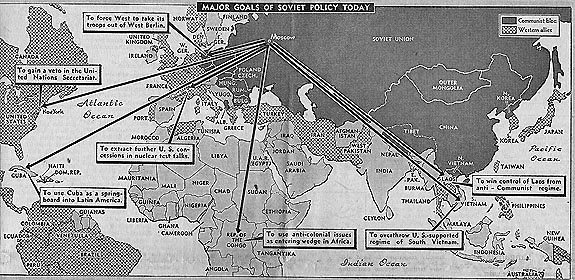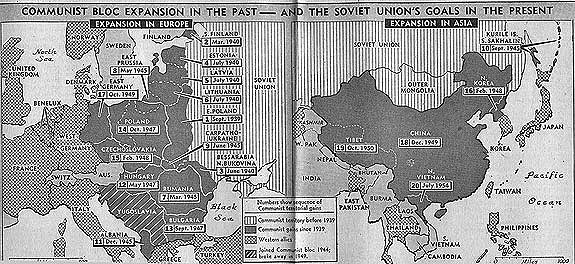For many in the West, the Cold War was a "zero-sum" game; "their" win--"their" referring to the "communists"--meant "our" loss. Politicians also spoke in terms of a "Domino Theory," i.e., if one country "went" communist, then another could go, and then another (like a long line of dominos falling).
In fact, it was President Eisenhower who first used the "domino" analogy way back in April 1954 to describe the situation in Indochina and the communist insurgency in Vietnam against the French. In any event, the idea of the dominos falling was repeatedly invoked by US presidents and politicians through the 1970s to justify the US involvement first in Vietnam and then more broadly in Southeast Asia (and even the entire world)--As you can see, from the point-of-view of critics, it is pretty easy to make the connection between "intervention to prevent the dominos from falling" and the idea of "neo-imperialism."
The other term usually associated with US policy during the Cold War, almost interchangeably with those old dominos, was the idea of "containment," i.e., that the free world had to "contain" the communist world and prevent any further expansion of communism. Remember between 1945 and 1949, all of Eastern and most of Central Europe "went" communist (or became "red); China turned communist and a part of Korea did too. The tide looked to be turing in favor of the "reds." A containment "dam" was in order.
The idea of "containment" is usually associated with George Kennan (1904-2005), US diplomat, historian and expert on Russia, but that association is a bit problematic and clearly seen by how quickly he was pushed out of the US policy establishment in the late 1940s because of his criticism of the US emphasis on military, armed containment of Russia. "My thoughts about containment" wrote Kennan, "were of course distorted by the people who understood it and pursued it exclusively as a military concept; and I think that that, as much as any other cause, led to [the] 40 years of unnecessary, fearfully expensive and disoriented process of the Cold War." (wikipedia)
OK, back to the story. In late 1946, while stationed in Moscow, Kennan sent his famous "Long Telegram" back to US Secretary of State James Byrnes. In the telegram was Kennan's analysis of Soviet behavior from the point-of-view of both domestic and international conditions. He included such commentary as:
- "Wherever it is considered timely and promising, efforts will be made to advance official limits of Soviet power."
- "Toward colonial areas and backward or dependent peoples, Soviet policy, even on official plane, will be directed toward weakening of power and influence and contacts of advanced Western nations, on theory that in so far as this policy is successful, there will be created a vacuum which will favor Communist-Soviet penetration."
- "Russians will strive energetically to develop Soviet representation in, and official ties with, countries in which they sense Strong possibilities of opposition to Western centers of power."
Kennan's prescription to counter any Soviet expansionary trends did not focus on military means:
- "But I would like to record my conviction that problem is within our power to solve--and that without recourse to any general military conflict."
- "Much depends on health and vigor of our own society. World communism is like malignant parasite which feeds only on diseased tissue."
- "We must formulate and put forward for other nations a much more positive and constructive picture of sort of world we would like to see than we have put forward in past."
What was in this "secret" telegram then was a policy prescription that emphasized a pro-active solution to the international dangers of communism, arguing that the West should improve the standards-of-living for people around the world so that communism could not take hold. This was exactly what he accomplished with his work on the Marshall Plan of economic aid to Europe in 1947. I think that was what Kennan wanted to emphasize in terms of combating communism, not a military build-up and a nuclear arms race.
In 1947, Kennan, under the pseudonym of "Mr. X," published in the public policy journal Foreign Affairs his famous article, "The Sources of Soviet Conduct," which was based on what he had written in the telegram. In the article, Kennan's "pro-active option" was still there, but there were also these two sentences, which ended up branding Kennan as a proponent of a policy of armed containment of communism--and what the Truman administration latched on to:
- "In these circumstances it is clear that the main element of any United States policy toward the Soviet Union must be that of long-term, patient but firm and vigilant containment of Russian expansive tendencies."
- "This would of itself warrant the United States entering with reasonable confidence upon a policy of firm containment, designed to confront the Russians with unalterable counter-force at every point where they show signs of encroaching upon he interests of a peaceful and stable world."
It was not surprising then that just before the article appeared in print, Truman appeared before Congress and used Kennan's statements from the "long telegram" as the basis for what became the "Truman Doctrine." "I believe," Truman argued "that it must be the policy of the United States to support free peoples who are resisting attempted subjugation by armed minorities or by outside pressures."
I have included below two maps that appeared in an unidentified newspaper in 1961. These illustrations were typical of what appeared in the public press by the early 1960s showing the onward march of the communist movement, and how somewhere the tide had to be stopped.




A quick search on the web turned up these sites with more information about the domino theory, and especially how it was used to justify American intervention in the conflict in Vietnam:
- Domino theory on wikipedia, "'The domino theory' was a 20th century foreign policy theory that speculated if one land in a region came under the influence of Communists, then more would follow in a domino effect."
- Domino Theory includes some good quotes from politicians about the rationale of stopping communism.
- The Domino Theory does a good job of making the connection to the idea of containment.
- John Kennedy and the Cold War clearly notes Kennedy's belief in the struggle between the US and USSR and his complete acceptance of the domino theory as justification for involvement in Vietnam.
- Interview Robert McNamara, "[The domino theory] was the primary factor motivating the actions of both the Kennedy and the Johnson administrations, without any qualification. It was put forward by President Eisenhower in 1954, very succinctly: If the West loses control of Vietnam, the security of the West will be in danger. "The dominoes will fall," in Eisenhower's words."
- Timeline of the Cold War is very good.

You would think that this bit of policy flotsam has since been discredited, but the idea remains prominent in US policy towards international terrorism and also the Middle East. (In kind of a reverse "domino" theory of spreading democracy by standing the dominos back up.)